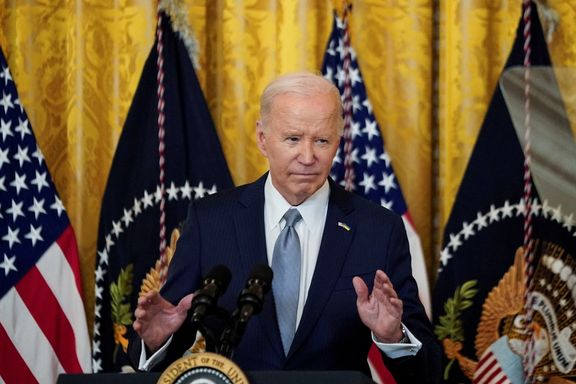Two Thirds Of US Electorate Fear War With Iran

A recent poll of US voters suggests about half the electorate think the Biden administration has been too lenient on Iran with two thirds thinking that will lead to war between the two sides.

A recent poll of US voters suggests about half the electorate think the Biden administration has been too lenient on Iran with two thirds thinking that will lead to war between the two sides.
The survey, conducted in early February by polster Rasmussen Reports and released this week, found that only 1 in 9 of likely voters think the Biden administration has been too aggressive with Iran. The survey of 749 Americans also showed that amid increasing tensions in the Middle East between Iran and the US, 24 percent see such a war as 'very lIkely'.
President Biden has been widely criticized for his Iran policy, which the critics deem too soft and even ‘appeasing.’ In pursuit of a nuclear agreement, Biden and his team reversed Trump’s "maximum pressure" policy, not enforcing oil export sanctions imposed in 2018, and releasing $16 billion in frozen funds last year, which all in all poured tens of billions of dollars to the regime’s coffers.
Biden critics also argue that these funds not only contributed to the October 7th attack, but more generally enabled Iran –through IRGC– to prop up its various proxies in the region and regain its otherwise receding foothold.
The Biden administration’s standard response to such criticisms is that it has been trying to avoid any escalation of the existing crisis, which could lead to direct confrontation with Iran. But this approach seems to have failed, at least as far as the likely American voters are concerned.
Two-thirds of those surveyed by Rasmussen Reports think that the current course of events in the Middle East will likely lead to war between the United States and Iran. Almost a quarter (24 percent) said that a war is "very likely". Only 2 percent felt a war between the countries is "not at all likely."
Each respondent were asked four questions, including:
In his dealings with Iran, has President Biden been too aggressive, not aggressive enough, or has his response been about right?
How likely is it that increasing tensions in the Middle East between Iran and the United States will lead to war?
Does the United States military have the ability to win an all-out war against Iran?
The last question yielded results that are more or less in line with the answers to the preceding questions. Most voters (65 percent) said they think the US military would likely win in an all-out war against Iran. Perhaps more significantly, 15 percent saw that potential war as one the US military cannot win. About 20 percent were unsure.
The survey comes with many usual polling caveats. As such, it does not offer a definite picture; nor could it be used to draw definite conclusions about American voters and their views of the US government’s foreign and defense policy.
Nonetheless, it can be said to highlight Joe Biden’s challenges in dealing with Iran less than nine months to the 2024 Presidential elections. Iran is almost certain to be a theme during the long campaign, especially since it’s increasingly linked with two major American concerns in Washington and beyond: China and Russia.
The two global powers and Iran often (and increasingly) take similar positions in global events. China buys close to the entirety of Iran’s oil exports. The revenue helps Iran fund its drone and missile programs, which is now advanced enough to help Russia in its war on Ukraine. It may not be accurate to call the trio an alliance, but it seems safe to say that they are heading in that direction.
The survey’s other question was on the same subject. “Which is a more dangerous enemy of the United States,” the respondents were asked, “Iran, China or Russia?”
Iranian officials, top IRGC commanders in particular revel in presenting the Islamic Republic as a world power. They will see the subject of Iran in the US presidential race a vindication of their propaganda that the regime is a major global player, irrespective of multiple economic and other crises it faces.
*Rasmussen surveyed 749 likely voters across the United States from Feb. 5-7, with a margin of error of 3 percentage points.